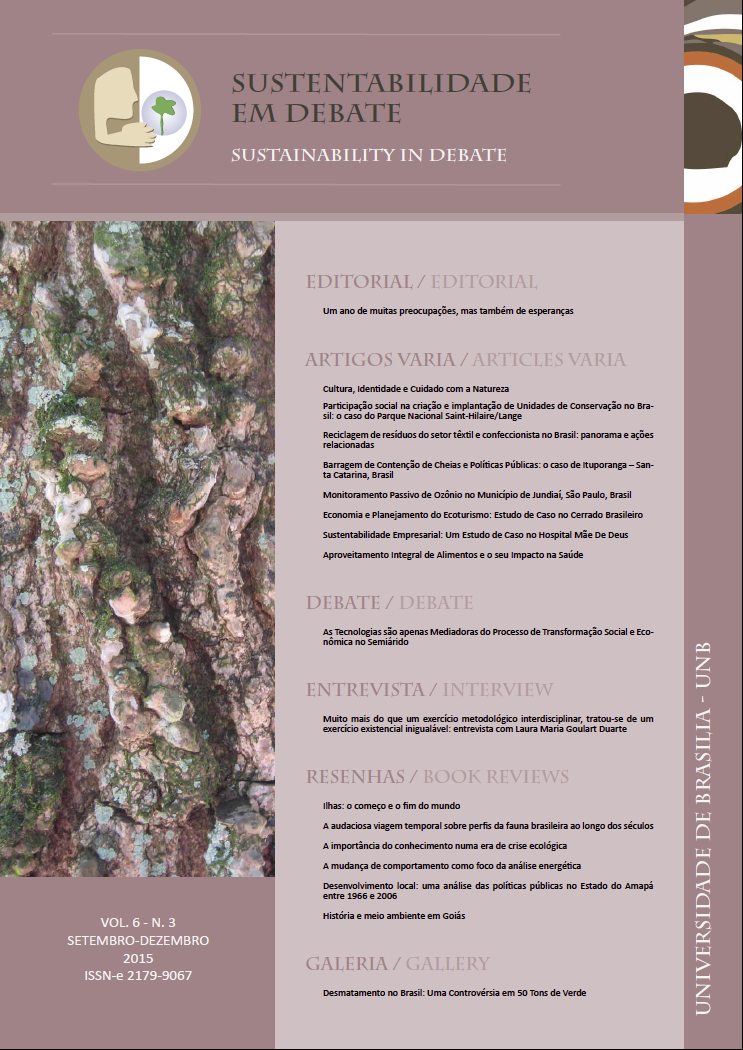Sustentabilidade Empresarial:
um estudo de caso no Hospital Mãe de Deus
DOI :
https://doi.org/10.18472/SustDeb.v6n3.2015.15196Mots-clés :
Sustentabilidade Empresarial, Pilar Econômico, Pilar Ambiental, Pilar Social, HospitalRésumé
O presente estudo tem como objetivo analisar como o conceito de sustentabilidade empresarial é operacionalizado no Hospital Mãe de Deus, situado em Porto Alegre, Rio Grande do Sul. Essa pesquisa classifica-se como bibliográfica, qualitativa-descritiva, baseada no desenvolvimento de um estudo de caso. Os dados foram coletados através de 09 entrevistas semiestruturadas com gestores da empresa e analisados por meio da análise de conteúdo qualitativa, com apoio do software N-Vivo. Os principais resultados mostram que o conceito de sustentabilidade empresarial está inserido no modelo de gestão de negócio que considera o pilar econômico e o social na tomada de decisão desde 2000. O econômico devido à necessidade de autossustentabilidade da rede do hospital e o social devido à natureza do negócio e a missão da congregação mantenedora.
Téléchargements
Références
BARBIERI, J. C. Organizações inovadoras sustentáveis. In: BARBIERI, J. C.; SIMANTOB, M. Organizações
inovadoras sustentáveis: uma reflexão sobre o futuro das organizações. São Paulo: Atlas,
2007.
BARBIERI, J. C.; VASCONCELOS, I. F. G. de; ANDREASSI, T.; VASCONCELOS, F. C. de. Inovação e sustentabilidade:
novos modelos e proposições. São Paulo: RAE ”“ Revista Administração Eletrônica,
v. 50, n. 2, p. 146-154, abr./jun. 2010.
BARDIN, L. Análise de conteúdo. Lisboa: Edições 70, 2010.
BELL, S.; MORSE, S. Sustainability indicators: measuring the immeasurable? 2. ed. Londres: Earthscan,
2008.
BOSSEL, H. Indicators for Sustainable Development: theory, method, applications. Canada: International
Institute for Sustainable Development, 1999.
BRUNDTLAND, G. In: WORLD COMMISSION ON ENVIRONMENT AND DEVELOPMENT ”“ WCED.
Our common future. Oxford: Oxford University Press, 1987.
CATALISA. Rede de Cooperação para a Sustentabilidade. 2003. Disponível em: <http://www.
catalisa.org.br/content/view/30/59/>. Acesso em: 14 fev. 2013.
CORAL, E. Modelo de planejamento estratégico para a sustentabilidade empresarial. (Tese de
Doutorado em Engenharia de Produção). Universidade Federal de Santa Catarina, Florianópolis
”“ SC, 2002.
DYLLICK, T.; HOCKERTS, K. Beyond the business case for corporate sustainability. Business Strategy
and the Environment, v. 11, p.130-141, 2002.
ELKINGTON, J. Cannibals with forks: the triple bottom line of 21st century business. Capstone
Publishing, Oxford, 1997.
EPSTEIN, M. J.; ROY, M. J. Making the business case for sustainability: linking social and environmental
actions to financial performance. Journal of Corporate Citizienship, v. 9, p. 79-96, 2003.
FLICK, U. Uma introdução à pesquisa qualitativa. 2. ed. Porto Alegre: Bookman, 2004.
GLADWIN, T. N.; KRAUSE, T.; KENNELLY, J. Eco-efficiency: toward socially sustainable business.
Sustainable Development, v. 3, p. 35-43, 1995.
GOBBLE, M. M. Innovation and sustainability. Research Technology Management, v. 55 (5), p.
64- 66, September ”“ October, 2012.
HART, S.; MISLTEIN, M. B. Criando valor sustentável. RAE Executivo, v. 3, n. 2, p. 65-79 maio/
julho 2004.
HOSPITAL MÃE DE DEUS. Balanço Social 2012. Porto Alegre: HMD, 2012.
HOSPITAL MÃE DE DEUS. 2014. Disponível em: <www.maededeus.com.br>. Acesso em: out.
2014.
LÖBLER, M. L.; SILVA, B. G.; POZZOBON, D. M.; GOMES, C. M. Strategic orientation towards sustainable
innovation: a case study in a Brazilian University. Journal of Technology Management &
Innovation, v. 7, n. 2, p. 196-206, 2012.
OPPEN, C. V.; BRUGMAN, L. Organizational capabilities as the key to sustainable innovation. XXII
ISPIM Conference Held in Hamburg-Germany, 12-15 June de 2011. Disponível em: <www.ispin.
org/members/proocedings/ISPIM2011/commonfiles/files/320710409_Paper.pdf>. Acesso em:
mar. 2013.
ORGANIZATION FOR ECONOMIC COOPERATION AND DEVELOPMENT - OECD. Core set of indicators
for environ¬mental performance reviews: a synthesis report by the group on the environment.
Paris: OECD, 1993.
PORTER, M. E.; KRAMER, M. R. Strategy e society: the link between competitive advantage and
corporate social responsibility. Harvard Business Review, p. 1-15, december 2006.
SAVITZ, A. W.; WEBER, K. A empresa sustentável: o verdadeiro sucesso é o lucro com responsabilidade
social e ambiental. Rio de Janeiro: Elsevier, 2007.
WERBACH, A. Estratégia para sustentabilidade: uma nova forma de planejar sua estratégia empresarial.
Rio de Janeiro: Elsevier, 2010.
YIN, R. K. Estudo de Caso: planejamento e métodos. 2. ed. Porto Alegre: Bookman, 2005.
Téléchargements
Publié-e
Comment citer
Numéro
Rubrique
Licence
SUSTAINABILITY IN DEBATE – Copyright Statement
The submission of original scientific work(s) by the authors, as the copyright holders of the text(s) sent to the journal, under the terms of Law 9.610/98, implies in the concession of copyrights of printed and/or digital publication to the Sustainability in Debate Journal of the article(s) approved for publication purposes, in a single issue of the journal. Furthermore, approved scientific work(s) will be released without any charge, or any kind of copyright reimbursement, through the journal’s website, for reading, printing and/or downloading of the text file, from the date of acceptance for publication purposes. Therefore, the authors, when submitting the article (s) to the journal, and gratuitous assignment of copyrights related to the submitted scientific work, are fully aware that they will not be remunerated for the publication of the article(s) in the journal.
The Sustainability in Debate Journal is licensed under Creative Commons License – Non-Commercial-No-Derivation Attribution (Derivative Work Ban) 3.0 Brazil, aiming at dissemination of scientific knowledge, as indicated on the journal's website, which allows the text to be shared, and be recognized in regards to its authorship and original publication in this journal.
Authors are allowed to sign additional contracts separately, for non-exclusive distribution of the works published in the Sustainability in Debate Journal (for example, in a book chapter), provided that it is expressed the texts were originally published in this journal. Authors are allowed and encouraged to publish and distribute their text online, following publication in Sustainability in Debate (e.g. in institutional repositories or their personal pages). The authors expressly agree to the terms of this Copyright Statement, which will be applied following the submission and publishing by this journal.






